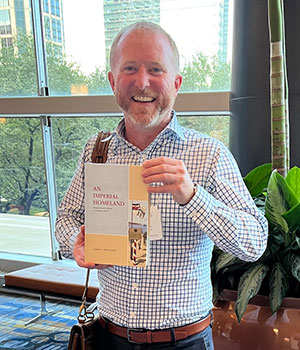UWs Blackler Publishes Book About German Identity in Southwest Africa
Published September 26, 2022

Adam Blackler, a University of Wyoming assistant professor of history, recently published his first book titled “An Imperial Homeland: Forging German Identity in Southwest Africa.”
The book -- published with the Max Kade Research Institute at Penn State University Press -- is scheduled for release Sept. 27 and will be available in hardcover and as an e-book.
The book’s primary contribution is that it traces German political and cultural engagement with, and reliance on, Southwest Africa as a formative element in becoming an empire, over a much longer time span than is typical for histories of German Southwest Africa, Blackler says.
“The book incorporates the now voluminous scholarship on the German empire that has probed its effects across different dimensions of German life. It shows that ‘colony and metropole’ became inextricably tied together, starting in an age that is not typically considered part of the story of the German empire and moving through the age of formal settler colonialism,” Blackler explains. “The book further reveals how profoundly the colonial experience in German Southwest Africa, and especially its violence, manifested in the elevation of a new ideal of German masculinity that emphasized characteristics thought to be pertinent both to succeeding in the colony, as well as in life in Germany in the Kaisserreich.”
The principal audiences for this work will be historians of modern Germany, modern Europe, imperial history and global history, according to Blackler.
Blackler has already discussed his tome with New Books Network online; the German Studies Association in Houston, Texas; the University of Minnesota; Penn State University; and the German History Society in London. Upcoming discussions are scheduled at Goucher College in Baltimore, Md.; the Hebrew University of Jerusalem in Israel; the George Mosse Center at the University of Wisconsin; the University of Oregon; the College of Charleston in Charleston, S.C.; and Heinrich Böll Stiftung in Berlin, Germany.
Blackler also recently received the Trans-Atlantic Summer Institute Grant -- worth $75,000 -- from the Deutscher Akademischer Austauschdienst (DAAD), or the German Academic Exchange Service. The DAAD is an international service that funds faculty and student research in Germany. While the grant is not directly connected to his book, the grant did engage with similar topics.
“My colleagues and I used the funding to organize an international seminar that focused on local discussions surrounding reparations and social justice in the context of Indigenous dispossession, anti-Black violence and structural racism,” Blackler says.
The seminar, titled “Reparations: A Global German Affair,” asked participants to engage with the following questions: What role does remuneration play in the aftermath of mass violence? Who gets to determine the parameters of these exchanges, and who is left out of the conversation? How do reparations shape historical memory in the communities representing victimized groups as well as in those compensating for past crimes?
At UW, Blackler is a historian of modern Germany and southern Africa. His research emphasizes the transnational dimensions of imperial occupation and settler-colonial violence in the 19th and 20th centuries. His scholarly and teaching interests also include the political and social dynamics of Germany’s Weimar Republic and the interdisciplinary fields of the Holocaust and genocide studies, and international human rights.

